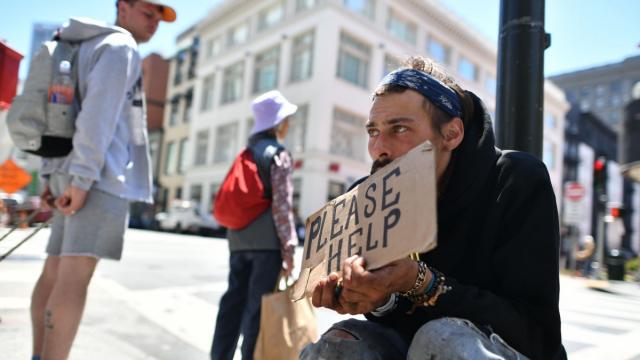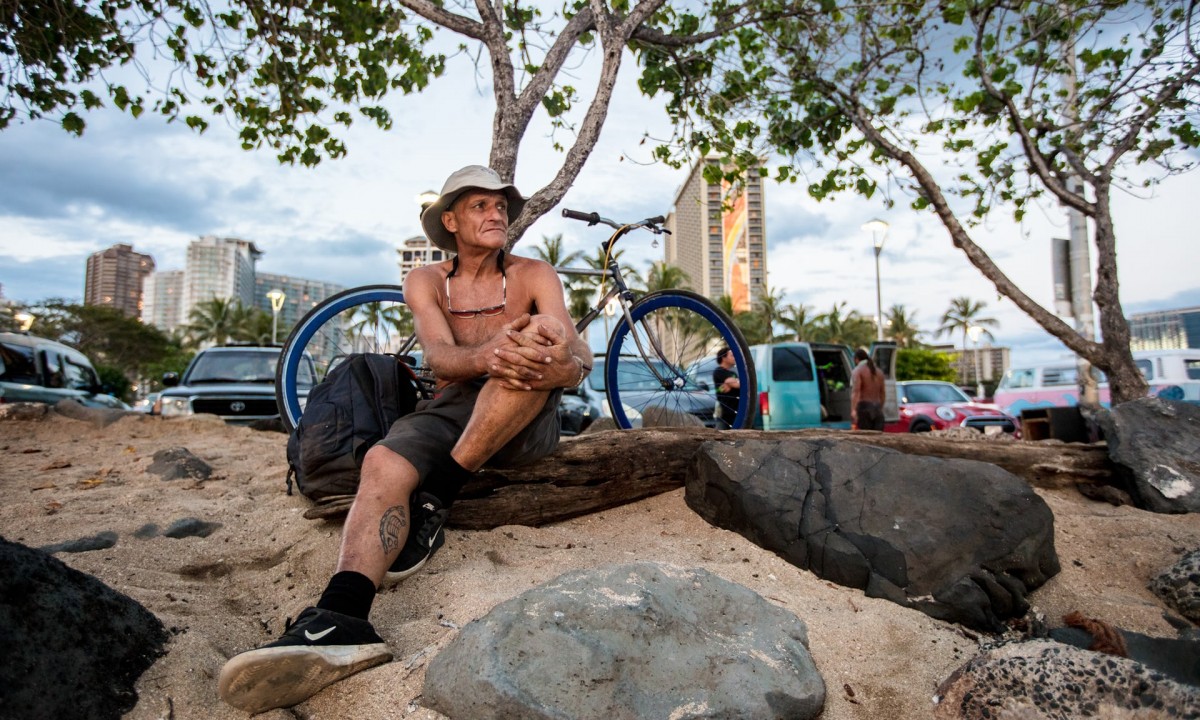
America’s homeless population has risen this year for the first time since the Great Recession, propelled by the housing crisis afflicting the west coast, according to a new federal study.
The study has found that 553,742 people were homeless on a single night this year, a 0.7% increase over last year. It suggests that despite a fizzy stock market and a burgeoning gross domestic product, the poorest Americans are still struggling to meet their most basic needs.
“The improved economy is a good thing, but it does put pressure on the rental market, which does put pressure on the poorest Angelenos,” said Peter Lynn, head of the Los Angeles homelessness agency. The most dramatic spike in the nation was in his region, where a record 55,000 people were counted. “Clearly we have an outsize effect on the national homelessness picture.”
Ben Carson, secretary of the Department of Housing and Urban Development, which produced the report, said in a statement: “This is not a federal problem – it’s everybody’s problem.”
Officials are due to announce the results on Wednesday morning.
Advocates who have witnessed the homelessness crisis unfold since it emerged in the early 1980s are grimly astonished by its persistence.
“I never in a million years thought that it would drag on for three decades with no end in sight,” said Bob Erlenbusch, who began working in Los Angeles in 1984.
The government mandates that cities and regions perform a homeless street count every two years, when volunteers fan out everywhere from frozen parks in Anchorage to palm-lined streets in Beverly Hills and enumerate people by hand. Those numbers are combined with the total staying in shelters and temporary housing. The tally is considered a crucial indicator of broad trends, but owing to the difficulties involved it is also widely regarded as an undercount.
“I’m surprised that [the numbers are] not going up faster than what that’s showing,” said John Parvensky, president of the Colorado Coalition for the Homeless.
There was an increase of 4.1% in New York. In the west, Seattle, Portland, San Diego, Sacramento and Oakland all reported surges of varying sizes. Most of the increase across the country is driven by people living in doorways, tents and RVs as opposed to in shelters. People of color are dramatically overrepresented: African Americans make up over one-third of the number.
In one sense the prevalence of homelessness seems odd, because the national poverty rate has fallen to around the same level as before the recession. Yet homelessness is linked to economic growth. In some of the nation’s more desirable major cities, housing is rapidly appreciating to a point where it is out of reach for lower earners.
Median hourly wages in the US have barely budged for decades, from $16.74 in 1973 to $17.86 in 2016, in terms of 2016 dollars, according to the Economic Policy Institute. But in New York, for instance, the hourly wage required to comfortably rent a one-bedroom is $27.29. In Los Angeles, it is $22.98.
Vacancy rates in these cities are low, and construction of new homes is lagging. The state of California estimates that 180,000 new housing units are needed each year in order to keep up with population growth. Over the last decade, however, there was an annual average of less than 80,000 units, because developers often face a long review process and local opposition.
A vibrant state economy hasn’t “translated into a quality of life improvement for a lot of Californians”, said Sara Kimberlin, a senior analyst at the California Budget and Policy Center. When housing costs are taken into account, California has the highest poverty rate in the nation, at 20.4%.
Observers say that the federal government’s response to homelessness is lackluster.
Two decades ago, Erlenbusch said, he and colleagues “sat around the table and said, ‘We’re done in five years, it’s obvious what the answer is: affordable housing.’” But government investment in low-income homes has lagged since it was slashed during the Reagan administration, and today most people on the cusp of homelessness do not receive government rental assistance. Indeed, the government spends twice as much on a housing tax break for the wealthiest Americans, and the tax reforms under review by Congress would deal a further blow to affordable-housing funding if enacted.
Localities are left to improvise solutions. Los Angelenos voted to tax themselves to provide billions in funding. Tiny-home villages have taken root in Oregon and Washington state (though a plan to erect them in Silicon Valley was met recently by angry residents chanting “build a wall” to keep homeless residents out). Hawaii is pursuing the idea of authorized tent encampments.
Reflecting on the new count results, another longtime homeless expert, Washington DC social worker Julie Turner, spoke ruefully of her optimism of 30 years ago. Back then, homelessness in America seemed like it was only temporary.
“I thought that I was going to work myself out of a job.”
3 WAYS TO SHOW YOUR SUPPORT
- Log in to post comments
















